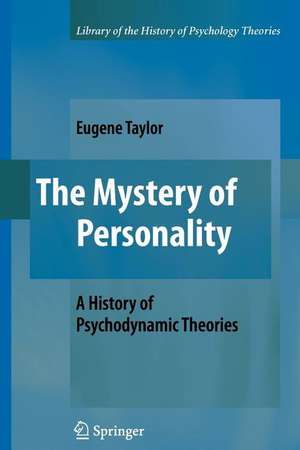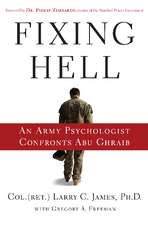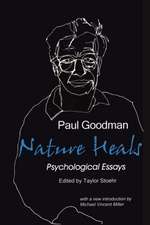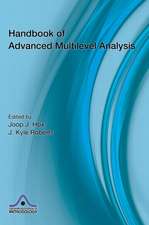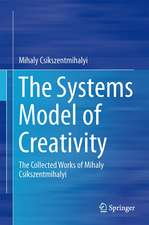The Mystery of Personality: A History of Psychodynamic Theories: Library of the History of Psychological Theories
Autor Eugene Tayloren Limba Engleză Paperback – 2 dec 2011
Gradual but vital evolutions form the heart of this chronicle: the ebb and flow of analytic theory and practice, the shift from doctor-centered to client-centered therapy, the movement from exclusionary to multidisciplinary, the evolving role of the therapist. And as can be expected from the author, there is special emphasis on the sublime in psychology: the philosophy/psychology fusion of the New England transcendentalists, the battle between spiritualism and science in 1880s America, and early versions of today’s spiritually-attuned therapies. Pivotal concepts and key individuals covered are:
- Charcot, Janet, and the origins of dynamic personality theory in the so-called French, Swiss, English, and American psychotherapeutic axis.
- Person and personality: William James’s "radical empiricism"
- The rise of psychoanalysis: Freud, the Freudians, and the Neo-Freudians
- Adler and Jung, who were never "students" of Freud: Toward, within, and beyond the self
- Murray, Allport, and Lewin at Harvard in the 30s
- Culture and personality, pastoral counseling, and Gestalt Psychology in New York in the ‘40s and ‘50s
- An Existential-humanistic and Transpersonally oriented depth psychology in the 60s
- The current era: "science confronts itself", as neuroscience enters the picture.
| Toate formatele și edițiile | Preț | Express |
|---|---|---|
| Paperback (1) | 702.87 lei 6-8 săpt. | |
| Springer – 2 dec 2011 | 702.87 lei 6-8 săpt. | |
| Hardback (1) | 956.50 lei 6-8 săpt. | |
| Springer – 13 iul 2009 | 956.50 lei 6-8 săpt. |
Preț: 702.87 lei
Preț vechi: 826.91 lei
-15% Nou
Puncte Express: 1054
Preț estimativ în valută:
134.49€ • 140.82$ • 111.55£
134.49€ • 140.82$ • 111.55£
Carte tipărită la comandă
Livrare economică 10-24 aprilie
Preluare comenzi: 021 569.72.76
Specificații
ISBN-13: 9781461417224
ISBN-10: 1461417228
Pagini: 420
Ilustrații: XII, 405 p.
Dimensiuni: 155 x 235 x 22 mm
Greutate: 0.59 kg
Ediția:2009
Editura: Springer
Colecția Springer
Seria Library of the History of Psychological Theories
Locul publicării:New York, NY, United States
ISBN-10: 1461417228
Pagini: 420
Ilustrații: XII, 405 p.
Dimensiuni: 155 x 235 x 22 mm
Greutate: 0.59 kg
Ediția:2009
Editura: Springer
Colecția Springer
Seria Library of the History of Psychological Theories
Locul publicării:New York, NY, United States
Public țintă
Professional/practitionerCuprins
The Trinity of Affinity: Personality, Consciousness, and Psychotherapeutics.- Charcot’s Axis.- Freud’s Shibboleth: Psychoanalysis.- The Freudians.- The Neo-Freudians.- Jung and Complex Psychology.- Adler’s Menschenkenntnis.- Psychodynamics, Gestalt Psychology, and Personality Theory at Harvard.- Anthropologists, Gestaltists, Jungians, and the Pastoral Theologians of New York.- An Existential-Humanistic and Transpersonally Oriented Depth Psychology.- Neuroscience and the Future of the Self.- Epilogue.
Recenzii
From the reviews:
“Taylor … offers a comprehensive, compelling account of psychodynamic theories. … the book reveals Taylor’s talent for historical rendition as he describes and situates dynamic theory within the history of psychology and within a specific cultural epoch. … Summing Up: Essential. Upper-division undergraduates through faculty.” (A. N. Douglas, Choice, Vol. 47 (4), December, 2009)
“The Mystery of Personality: A History of Psychodynamic Theories is a historical treatment of 20th-century personality theory, the unconscious, and psychotherapy … . a valuable encyclopedic resource for the history of Western psychotherapeutic and personality theory traditions. … This … work is a most welcome contribution. … The Mystery of Personality is best suited to those psychologists and personality theorists who already know many of the facts and who are familiar with most of the characters and their stories.” (Rachael I. Rosner, PsycCRITIQUES, Vol. 55 (18), May, 2010)
“As a volume keen to detail the historical shifts in psychodynamic theory – and the place of psychodynamic theory in personality development – this author succeeds brilliantly. He outlines with extraordinary thoroughness the shifts over the past century or more … . Historically interested parties will find much in this volume to enjoy and to learn. … it will be of interest to the reader that attention is given by this author to the nature of how any theorist must approach his or her work … .” (Rudy Oldeschulte, Metapsychology Online Reviews, Vol. 14 (43), October, 2010)
“Taylor … offers a comprehensive, compelling account of psychodynamic theories. … the book reveals Taylor’s talent for historical rendition as he describes and situates dynamic theory within the history of psychology and within a specific cultural epoch. … Summing Up: Essential. Upper-division undergraduates through faculty.” (A. N. Douglas, Choice, Vol. 47 (4), December, 2009)
“The Mystery of Personality: A History of Psychodynamic Theories is a historical treatment of 20th-century personality theory, the unconscious, and psychotherapy … . a valuable encyclopedic resource for the history of Western psychotherapeutic and personality theory traditions. … This … work is a most welcome contribution. … The Mystery of Personality is best suited to those psychologists and personality theorists who already know many of the facts and who are familiar with most of the characters and their stories.” (Rachael I. Rosner, PsycCRITIQUES, Vol. 55 (18), May, 2010)
“As a volume keen to detail the historical shifts in psychodynamic theory – and the place of psychodynamic theory in personality development – this author succeeds brilliantly. He outlines with extraordinary thoroughness the shifts over the past century or more … . Historically interested parties will find much in this volume to enjoy and to learn. … it will be of interest to the reader that attention is given by this author to the nature of how any theorist must approach his or her work … .” (Rudy Oldeschulte, Metapsychology Online Reviews, Vol. 14 (43), October, 2010)
Notă biografică
Eugene Taylor holds the AB and MA in general experimental psychology and Asian studies from Southern Methodist University and the PhD in the history and philosophy of psychology from the University Professors Program at Boston University. He was a 1983 Lowell Lecturer for the Massachusetts Medical Society and the Boston Medical Library; the 1984 William James Lecturer on The Varieties of Religious Experience at Harvard Divinity School; and the 1986 Gardner Murphy Memorial Lecture for the American Society for Psychical Research. And for the past 18 years has given the annual Wilfred Gould Rice Lecture on Psychology and Religion for the Swedenborg Society at Harvard. He is a co-author with Benjamin White and Richard Wolfe of Stanley Cobb: Builder of the Modern Neurosciences (1984); and author of William James on Exceptional Mental States (1983); William James on Consciousness Beyond the Margin (1996) with Robert Wozniak (eds) Pure Experience: The Response to William James(1996); and forthcoming, William James and the Spiritual Roots of American Pragmatism His primary academic affiliation is at Saybrook Graduate School in San Francisco, a graduate program in distance learning for mid-career adults, where he is a member of the Executive Faculty. He is also a Lecturer on Psychiatry at Harvard Medical School and functions as the Historian in Psychiatry at the Massachusetts General Hospital. He lives in Cambridge, Massachusetts.
Textul de pe ultima copertă
In The Mystery of Personality: A History of Psychodynamic Theories, acclaimed professor and historian Eugene Taylor synthesizes the field’s first century and a half into a rich, highly readable account. Taylor situates the dynamic school in its catalytic place in history, re-evaluating misunderstood figures and events, re-creating the heady milieu of discovery as the concept of "mental science" dawns across Europe, revisiting the widening rift between clinical and experimental study (or the couch and the lab) as early psychology matured into legitimate science.
Gradual but vital evolutions form the heart of this chronicle: the ebb and flow of analytic theory and practice, the shift from doctor-centered to client-centered therapy, the movement from exclusionary to multidisciplinary, the evolving role of the therapist. And as can be expected from the author, there is special emphasis on the sublime in psychology: the philosophy/psychology fusion of the New England transcendentalists, the battle between spiritualism and science in 1880s America, and early versions of today’s spiritually-attuned therapies. Pivotal concepts and key individuals covered are:
Gradual but vital evolutions form the heart of this chronicle: the ebb and flow of analytic theory and practice, the shift from doctor-centered to client-centered therapy, the movement from exclusionary to multidisciplinary, the evolving role of the therapist. And as can be expected from the author, there is special emphasis on the sublime in psychology: the philosophy/psychology fusion of the New England transcendentalists, the battle between spiritualism and science in 1880s America, and early versions of today’s spiritually-attuned therapies. Pivotal concepts and key individuals covered are:
- Charcot, Janet, and the origins of dynamic personality theory in the so-called French, Swiss, English, and American psychotherapeutic axis.
- Person and personality: William James’s "radical empiricism"
- The rise of psychoanalysis: Freud, the Freudians, and the Neo-Freudians
- Adler and Jung, who were never "students" of Freud: Toward, within, and beyond the self
- Murray, Allport, and Lewin at Harvard in the 30s
- Culture and personality, pastoral counseling, and Gestalt Psychology in New York in the ‘40s and ‘50s
- An Existential-humanistic and Transpersonally oriented depth psychology in the 60s
- The current era: "science confronts itself," as neuroscience enters thepicture
Caracteristici
Includes supplementary material: sn.pub/extras
